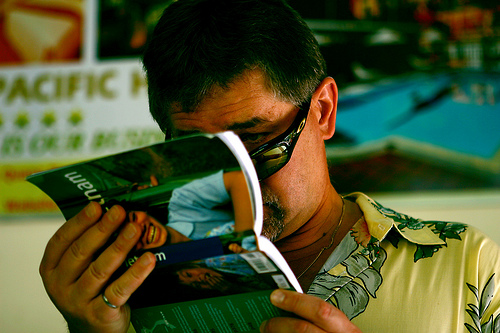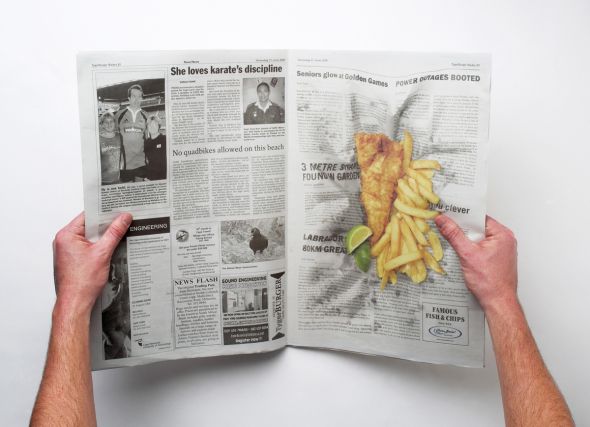
On the web, small, seemingly insignificant things can have incredibly wide-reaching effects. A small ad placed next to a search result might be the start of a massive new enterprise. A service that lets you share your status, photos and links with others might become the largest social network on earth. Small changes. Big results.
And one day, people might say something similar about location service Foursquare and Location Layers – a feature that lets Foursquare ‘layer’ information from certain brands on top of certain venues. Check-in at a Starbucks and get some local news. Check-in at an underground bar and get a bit of trivia as to who was once there. Small change. But with possibly very big effects.
Location Layers aren’t entirely new. They’ve been around since at least February. But the recent integration with the Independent Film Channel and The Huffington Post shows just how much promise this small feature has as a useful tool for both business and culture because they provide a whole new way of accessing information.
Though it may seem like an exaggeration, I believe this means that Foursquare will become to the mobile web what Google is to search and Facebook is to social networking: the biggest players in their respective fields, and a cultural force all their own.
Here’s why.
Crowdsourcing The Cool

IFC’s integration into Foursquare is deviously simple and effective. The film channel asked its users to upload tips for their favorite locations. They then picked out the ones that best fit with the ‘Independent Film Channel’s’ alternative vibe, and then posted them to Foursquare under the IFC brand. So when users follow IFC, they can either simply look at the information and choose to follow the recommendations there, or choose to get push updates whenever they check-in near one of the listed venues.
Put another way, it’s like getting a guided tour of a city from a site that prides itself on being on the cutting edge.
So imagine. An established indie music website does the same, and you can get a guided a tour of all your favorite bands’ hangouts. Or you could get a Hollywood-style ‘guide to the stars’.
More importantly though, rather than these tidbits of information about where the cool places and people are being limited to hipsters and movers and shakers, anyone could get access to this information. In a way, it’s like democratizing the local – it makes the secret tips about the great, hidden places in a city open to way more people.
The Travel Guide 2.0
More than just ‘tips from the cool kids’ though, one imagines that using Foursquare in new cities may render the traditional travel guidebook obsolete.
Think of it this way. For all of its benefits, one of the problems inherent in using something like Foursquare and crowdsourcing in general is that users aren’t entirely sure if they can trust that User8373’s recommendation that a bar is “TEH BEST PLACE EVAH!”.
So, what Foursquare could do is partner with a company like Lonely Planet to provide verified, tested tips and to-do lists for ‘experiencing a city as a local’ or ‘taking a literary tour of Dublin’ or something similar.
On a more basic level, you could get alerts when you pass a recommended bar, restaurant or tourist attraction. And really, it’s this that’s key; there’s a fundamental difference between reading about somewhere in a bar and being told about it when you walk by it. Essentially, Foursquare would become an augmented reality app, guiding you around the cities you live in and visit as you walk around them. That lends itself to a kind of discovery and engagement that just isn’t possible by simply Googling random results while you’re on the street.
A New Era in Personalized News
For years now, people have been talking about the way the web lets you customize news and personalize it to your own interests. But, despite many attempts, ‘hyperlocal news’ – information about the immediate vicinity around you – has yet to catch on in a big way.
But Foursquare’s integration with the Huffington Post provides an example of how the hyperlocal could be improved by pushing information to you about your neighborhood while you are actually moving around it.
This ushers in a new way of doing personalized news because, by tying it to location, it makes news relevant with an immediacy of place and time that just wasn’t possible before. It is also part of a change of what constitutes ‘news’. After all, maybe a local community bake sale is news when you happen to be walking past that community center. Or, conversely, the police may be able to put out news about a string of break-ins in a specific neighborhood. These are things that are too small to make the local TV news but that are still important to people’s lives, and Foursquare helps connect potential service providers to an ever-growing user base.
And on top of this, it answers one of the big criticisms of personalized news: that people only look at what they’re interested in and miss what could be very important issues because they aren’t sexy or flashy. Instead, by pushing information out, Foursquare becomes a way to ‘return’ to the serendipity in news that came with reading a newspaper or watching TV.
A Possible Threat to Google and Twitter?
To many, the kind of features described here seem ‘neat’ – or possibly even banal. But another perspective is that they are what’s going to build Foursquare into the Google of mobile.
Now, obviously Foursquare isn’t going to unseat Google – or even Twitter. But, as they develop an impressive wealth of local information, they may be able to establish themselves as the default platform for location-based services. And by using that platform to partner with a variety of brands, Foursquare, like Google before it, could actually become a huge business and a cultural resource by becoming the way people engage with information about the spaces that immediately surround them.
People are increasingly looking to personalized, crowdsourced solutions to search. Twitter is now getting 800 million search queries a day. That’s every day. People want information that is tailored to them. By positioning itself as the go-to way for people to get local information, Foursquare with its simply check-in system may become something huge.
And really, if it does, this will be good news for us all. After all, Foursquare:
- connects people with their own neighborhoods;
- allows the people who live their to tell you about those places;
- provides specialized, tailored guides to a city or town
- opens up local information to a much wider group of ‘authors’ and ‘readers’
- gives users unique information relevant to their own spaces, rather than whole cities or areas
As of yet, it’s unclear how Twitter, Google or Facebook will implement local features, so right now, local is up for grabs. If anything, it’s Facebook that Foursquare should be most worried about because their massive, engaged user base could also provide a huge resource of local information.
But what’s clear is that local will be a huge resource, both for businesses looking for new revenue streams and people looking for information. And if the point of the web was to make it easier and faster for people to learn about and then engage with their world, then services like Foursquare are helping to realize that dream.




GIPHY App Key not set. Please check settings
2 Comments